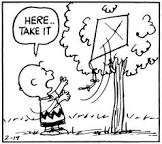Kite-Eating Tree


The Kite-Eating Tree is a fictional tree in the Peanuts comic strip created by Charles M. Schulz.[2] In the comics, when Charlie Brown attempts to fly a kite, the kite always ends up tangled in the tree. In an editorial from 1964, the U.S. Catholic stated that Charlie Brown's encounters with the Kite-Eating Tree represent "defeat, but not capitulation" because Charlie Brown "refuses to concede that the impossible won’t someday happen—that he will manage to get the kite in the sky, where it belongs."[3]
Schulz considered the tree one of the series' 12 major set pieces.[4][5] He created the tree in response to his experiences with kites getting caught in trees, both as a child and when flying kites with his children. He stated that the kite "usually disappears over a period of several weeks. Now obviously the kite had to go someplace, so it seemed to me that the tree must be eating it."[6]
In the first series featuring the Kite-Eating Tree, which ran in April 1956, Charlie Brown holds onto the string of his kite in the tree for eight days before having to let go when it begins raining. This instance was cited as demonstrating that the "humor of Peanuts lies in the extremity of bad luck the characters" face.[7] In a 1977 series, Charlie Brown bit the tree, after which he received a legal notification from the Environmental Protection Agency.[8][9][10] In yet another series in January 1969, Lucy becomes so enraged at Schroeder continually ignoring her that she seizes his piano and throws it up into the tree, which proceeds to devour it.[11]
The Kite-Eating Tree has played a part in adaptations of the comic strip, including the musical You're a Good Man, Charlie Brown (1967)[12] and The Peanuts Movie (2015).[13] And it is featured as part of a ride at Camp Snoopy, the Peanuts-themed area within Knott's Berry Farm.[14] At the Charles M. Schulz Museum and Research Center, a tree in the courtyard is designated as a representation of the Kite-Eating Tree.[15]
In popular culture[edit]
- In the Robot Chicken episode "Vegetable Funfest" in the skit "The Time of the Great Pumpkin", a parody of It's The Great Pumpkin, Charlie Brown where Linus summons the Great Pumpkin using black magic which goes around killing the Peanuts characters in a horror movie fashion. The last survivor Charlie Brown flees to the Kite-Eating Tree which ends up eating the Great Pumpkin, saving Charlie Brown's life and ending the Great Pumpkin's rampage.
- Version 3.4.3 of the R programming language was nicknamed as Kite-Eating Tree.[16]
References[edit]
- ^ Sharon Begley (2007-10-13). "The Dark Side of Charles Schulz". Newsweek. Retrieved 8 November 2015.
- ^ Schulz, Charles M. (2009-10-20). Celebrating Peanuts: 60 Years. Andrews McMeel Publishing. p. 4. ISBN 9780740785481. Retrieved 8 November 2015.
- ^ Martin Jezer (February 1964). "50 years ago in U.S. Catholic: What makes Peanuts run?". US Catholic. pp. Vol. 29, No. 2, pages 15–18. Retrieved 8 November 2015.
- ^ Rhodri Marsden (22 May 2014). "Rhodri Marsden's Interesting Objects: Linus's blanket". The Independent. Retrieved 8 November 2015.
- ^ Harvey, Robert C. (1994). The Art of the Funnies: An Aesthetic History. Univ. Press of Mississippi. pp. 216–. ISBN 9780878056125. Retrieved 29 August 2015.
- ^ Commrie, Anne (1976-11-17). Something about the Author. Gale. ISBN 9780810300682. Retrieved 29 August 2015.
- ^ Jennifer Latson (Oct 2, 2014). "Peanuts Comic Strip Debut October 2 1950". Time. Retrieved 8 November 2015.
- ^ Bergman, Gregory; Lambert, Josh (2010-12-18). Geektionary: From Anime to Zettabyte, An A to Z Guide to All Things Geek. Adams Media. pp. 63–. ISBN 9781440511899. Retrieved 29 August 2015.
- ^ Daniel Terdiman (October 2, 2010). "Celebrating 60 years of 'Peanuts'". CNET. Retrieved 8 November 2015.
- ^ Rich Clabaugh (September 25, 2010). "The Complete Peanuts 1977-1978 - CSMonitor.com". The Christian Science Monitor. Retrieved 8 November 2015.
- ^ "Peanuts by Charles Schulz for January 24, 1969". GoComics. Retrieved 2022-08-31.
- ^ Lea Salonga (March 7, 2012). "Happiness is watching 'Peanuts' gang onstage". Philippine Daily Inquirer. Retrieved 8 November 2015.
- ^ K.M. McFarland (November 6, 2015). "A CGI Peanuts Movie Shouldn't Be Surprising at All". Wired. Retrieved 8 November 2015.
- ^ REBECCA KHEEL (January 14, 2014). "Knott's announces 3 new Camp Snoopy rides". Orange County Register. Retrieved 8 November 2015.
- ^ Mary Lu Laffey (March 28, 2014). "Good grief! Schulz museum preserves legacy of laughter - PostBulletin.com: Travel". Post Bulletin. Retrieved 8 November 2015.
- ^ "CRAN: Sources". cran.r-project.org. Retrieved 2017-12-21.
